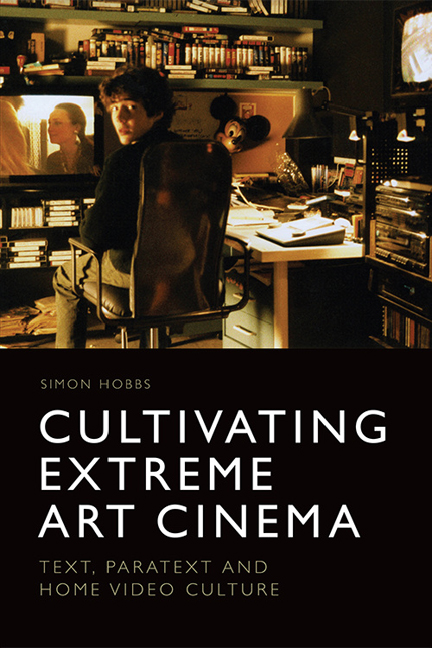Book contents
- Frontmatter
- Contents
- List of Figures
- Acknowledgements
- 1 Introduction
- 2 Art and Exploitation: Crossover, Slippage and Fluidity
- 3 Early Extremity on DVD: History, Precursors and Exploitation Auteurs
- 4 Weekend and Cannibal Holocaust: Art, Ballyhoo and Remediation
- 5 Salò, Or the 120 Days of Sodom and Ilsa, the Wicked Warden: Fascism, Pornography and Disgust
- 6 Contemporary Extremity on DVD: Trends, Hard-core and Geographic Mobility
- 7 Michael Haneke: Glaciation, Legitimacy and Transgression
- 8 Lars von Trier: Provocation, Condemnation and Confrontation
- 9 Conclusion
- Bibliography
- Index
5 - Salò, Or the 120 Days of Sodom and Ilsa, the Wicked Warden: Fascism, Pornography and Disgust
Published online by Cambridge University Press: 28 April 2021
- Frontmatter
- Contents
- List of Figures
- Acknowledgements
- 1 Introduction
- 2 Art and Exploitation: Crossover, Slippage and Fluidity
- 3 Early Extremity on DVD: History, Precursors and Exploitation Auteurs
- 4 Weekend and Cannibal Holocaust: Art, Ballyhoo and Remediation
- 5 Salò, Or the 120 Days of Sodom and Ilsa, the Wicked Warden: Fascism, Pornography and Disgust
- 6 Contemporary Extremity on DVD: Trends, Hard-core and Geographic Mobility
- 7 Michael Haneke: Glaciation, Legitimacy and Transgression
- 8 Lars von Trier: Provocation, Condemnation and Confrontation
- 9 Conclusion
- Bibliography
- Index
Summary
This second case study will examine the paratextual presentation of Pier Paolo Pasolini's Salò, Or the 120 Days of Sodom, and Jess Franco's Ilsa, the Wicked Warden. In a general sense, these two directors partake in the history of taste slippage mapped thus far, with both displaying extreme imagery, experimental visuals and counter-cultural attitudes. More specifically, the films selected for analysis here express a more direct relationship, with both tackling issues of fascism and political exploitation. With this affiliation forming a basis for the films’ comparison here, the chapter will investigate the way they borrow from art and exploitation traditions, and the impact this has upon their paratextual identities.
Pier Paolo Pasolini and Salò, Or the 120 Days of Sodom
Pasolini, like Jean-Luc Godard, Luis Buñuel and Ingmar Bergman, is an essential filmmaker within the framework of extreme art cinema. Described by Robert Gordon as a restlessly experimental artist (1996: 1), Pasolini's combination of artistry and provocation has seen him condemned by the Pope (Greene 1990: 134) – and hailed as an auteur:
Pasolini's belief in his capacity to impose his voice on any medium, despite its constraints, was reaffirmed […] by his experience with film. He repeatedly asserted his autonomy and authority as an ‘auteur’, confidently declaring his control over every aspect of the film-making process. (Gordon 1996: 191)
Maurizio Viano describes the director as the ‘black’ filmmaker of the bourgeoisie (1993: 296), an outcast operating externally to the parameters of ‘high’ culture yet still able to penetrate its barriers. This semi-marginality arose from Pasolini's efforts to challenge his primary art-house demographic with a mixture of extremity and intellectualism. In essence, his films encapsulate the traditions of the extreme art canon, as they combine extremity, critical condemnation, artistic experimentation, intellectual engagement and cultural authentication.
This amalgamation is clearest within Salò, Or the 120 Days of Sodom (hereafter, Salò), the director's final feature. Naomi Greene insists Salò is not only Pasolini's most scandalous and chilling film, but also one of the most disturbing and radical films in the history of cinema (1990: 196). Although based on Marquis de Sade's 120 Days of Sodom (2009) (originally published in 1785), Pasolini moved the action to Benito Mussolini's Republic of Salo.
- Type
- Chapter
- Information
- Cultivating Extreme Art CinemaText, Paratext and Home Video Culture, pp. 88 - 113Publisher: Edinburgh University PressPrint publication year: 2018



